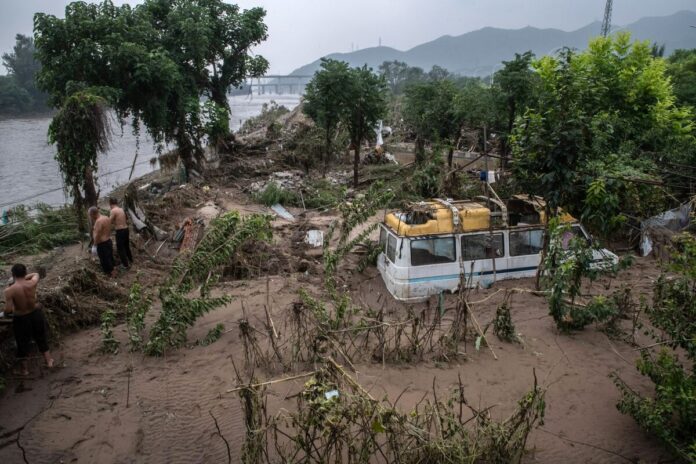Chinese flood victims in hard hit areas of northern China have taken aim at a key Communist Party official, saying he sacrificed their safety to protect President Xi Jinping’s flagship projects.
A hashtag playing off a comment by Ni Yuefeng, the Communist Party boss of Hebei province, had more than 80 million views on China’s Twitter-like Weibo on Thursday. Many people expressed anger at Ni because he called for cities in the province bordering Beijing to “resolutely play a good role of moat for the capital.”
He said the Xiong’an area — a new city China started building in 2017 that Xi has described as a project of “millennial significance” – represented “the top priority of flood control in our province.”
Censors banned the hashtag on Ni’s comments later Thursday. Hu Xijin, former editor-in-chief of Global Times, wrote in a post on his Weibo account that the safety of people’s lives and property should be equally important in Beijing and its surrounding areas. He criticized the idea that Hebei should be a “moat” of the capital, without naming Ni.
Another senior official, Li Guoying, China’s minister of water resources, made similar remarks about Xiong’an and Beijing Daxing International Airport, the 80 billion yuan ($11.1 billion) facility south of the capital that opened in 2019.
See: China’s ‘Sponge Cities’ Are Not Built for Extreme Flood Events
Ni’s comments came Tuesday, as rain fell for a fourth day across the capital and its surrounding region, including the heaviest downpour in one area of the capital since record-keeping began in the 19th century.
The precipitation caused severe flooding in lesser-known towns in Hebei, such as Zhuozhou, population 630,000. Video clips showed waist-deep water flowing though streets that rescuers had to traverse on inflatable skiffs.
“This official only wants a promotion, he doesn’t care whether people live or die,” one internet user wrote, referring to Ni.
Another person called for Ni’s removal, along with Wang Zhengpu, effectively the second-most powerful figure in the province. “You want to protect Beijing, Tianjin, Xiong’an and Daxing airport,” the person wrote. “Then we Hebei people don’t need you. Get out of Hebei!”
More: Beijing’s Deadly Storms Brought Heaviest Rainfall on Record
Neither Xi nor Chinese Premier Li Qiang has made a public appearance since northern China was hit by historic floods. On Thursday, Xi’s chief of staff Cai Qi greeted experts in the seaside resort of Beidaihe, some 200 kilometers east of Beijing, suggesting the top leadership has started its two-week summer retreat.
The Communist Party’s mouthpiece newspaper, the People’s Daily, on Friday reported that a group of Xi’s acquaintances from Iowa had visited Xiong’an earlier last month and been “impressed” by the city.
Hebei has reported nine deaths due to the flooding so far, and 11 people died in Beijing. The death toll may rise because several more people are reported missing. The government hasn’t said how much economic damage was caused in total.
Calls to the Ministry of Water Resources in Beijing went unanswered. A person who answered the phone at the Communist Party’s offices in Shijiazhuang, the capital Hebei province, declined to comment.
Some internet users voiced suspicion that authorities directed floodwaters toward areas of Hebei and away from Daxing and Xiong’An.
A team from China Agriculture University that was using remote-sensing technology to detect water levels said in a social media post on Wednesday that seven catchment areas in Hebei were put into use from Sunday evening to help flood control efforts in Beijing, Tianjin and Xiong’an.
Two of those zones are close to Zhuozhou.
Li Na, a Hebei province water resources official, told China Central Television that heavy rain and floodwaters traveling down rivers from Beijing were among the main reasons Zhuozhou flooded.
Even before the recent disaster, authorities in Hebei had publicly stated that ensuring Beijing, Tianjin and Xiong’an are safe is a priority. One Weibo user posted a photo he once took of a sign at a museum in Baoding, another flood-hit city in Hebei.
The sign lists the objectives of the city’s flood-control efforts: First, protecting Beijing and Tianjin. Second, protecting Xiong’an. Third, protecting Baoding itself.
“If local leaders dared to put this slogan on a board and showed the public, they should also dare to face people’s questioning,” the person wrote in a post that later disappeared from Weibo.









































